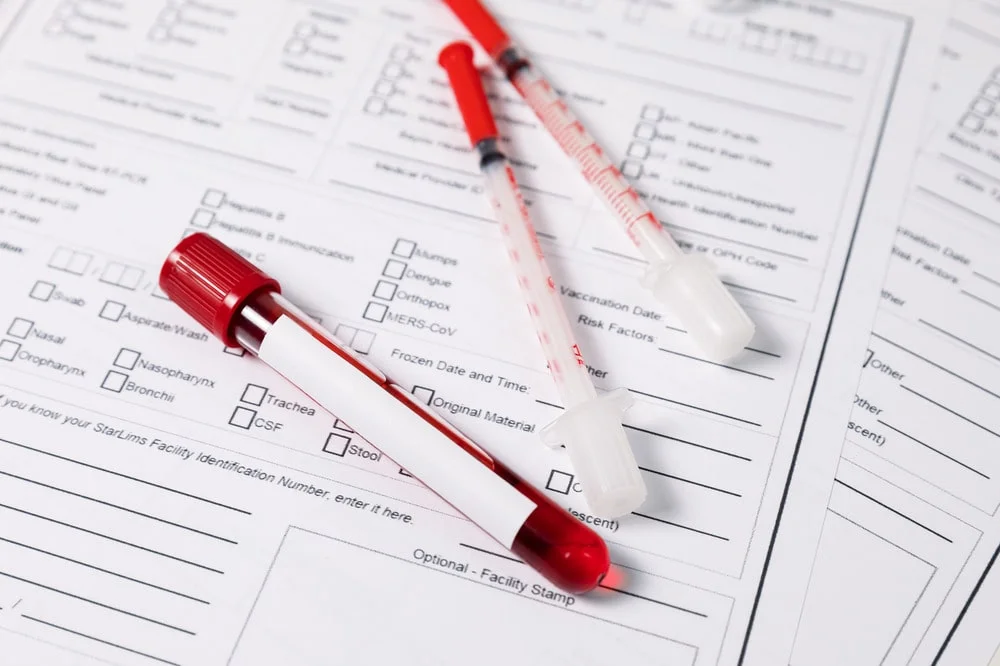Your blood contains an abundance of information about your general health. One of the most important information it offers is regarding the health of your liver and kidneys. These two organs are essential for filtering pollutants, regulating metabolism, and maintaining bodily equilibrium. A blood test for liver and kidney problems can detect early signals of damage, even before symptoms arise. Let’s look at what your blood tests can disclose about these vital organs.

Can blood tests detect liver disease before symptoms appear?
Yes, blood testing can detect liver illness much before symptoms appear. The liver function blood test examines enzymes and proteins, which reflect how effectively your liver is functioning. Increased levels of specific enzymes, such as ALT (alanine aminotransferase) and AST (aspartate aminotransferase), might indicate liver inflammation or injury. Early identification through regular screening enables early intervention and lifestyle adjustments to avoid serious problems.
What blood tests are used to detect kidney problems?
If you are wondering, can blood work detect kidney problems? The answer is YES!
Several blood tests can help determine kidney health. Kidney function blood tests typically measure:
- Creatinine levels: High levels may suggest impaired renal function.
- Blood Urea Nitrogen (BUN): Elevated BUN levels indicate that your kidneys are working hard to eliminate waste.
- Glomerular Filtration Rate (GFR): This test evaluates how efficiently your kidneys filter blood.
A blood test for kidney disease allows doctors to establish if your kidneys are working normally and whether further tests or treatments are required.
How do I know if my blood work indicates liver or kidney issues?
Your blood work might show abnormal blood test results of liver or kidney function issues if:
- Liver enzymes (ALT and AST) are high.
- Bilirubin levels are elevated, indicating possible liver disease.
- Creatinine and BUN values are above normal, indicating renal issues.
- Low albumin levels indicate impaired liver or kidney function.
If any of these indicators go beyond the normal range, your doctor may prescribe further tests to get a more exact diagnosis.
What is the most common blood test for liver problems?
The liver function blood test is the most commonly used to detect liver problems. It measures:
- ALT and AST: Elevated values suggest liver inflammation or damage.
- Alkaline Phosphatase (ALP): Elevated levels of alkaline phosphatase (ALP) may indicate bile duct difficulties or liver illness.
- Bilirubin: Excess bilirubin may suggest liver malfunction or bile flow difficulties.
- Albumin and Total Protein: Albumin and Total Protein: Low levels may indicate liver illness
Can blood tests detect liver Cirrhosis?
True, but not immediately. A blood test for liver disease can detect liver damage that may progress to Cirrhosis. Common indicators of Cirrhosis include:
- Low albumin levels
- High bilirubin levels
- Increased liver enzymes (ALT, AST, and ALP)
- Longer blood clotting time (INR test)
Additional imaging studies, such as ultrasonography or MRI, may be required for confirmation.
Is kidney failure detectable through a blood test?
Yes. A blood test for kidney function can indicate renal failure. High creatinine and BUN values, together with a considerably decreased GFR, suggest advanced renal disease. Early discovery is critical since kidney damage is typically irreparable but manageable with correct treatment.
Can routine blood tests check for both liver and kidney health?
Absolutely. Routine blood tests for liver and kidney function entail:
- The Comprehensive Metabolic Panel (CMP) measures liver enzymes, renal function indicators, and electrolytes.
- The Basic Metabolic Panel (BMP) focuses on kidney function and critical electrolytes.
- The Liver Panel provides a thorough examination of liver function.
These periodic tests allow physicians to identify any health issues before they become serious.
How accurate are blood tests for detecting liver or kidney problems?
Blood tests are highly accurate in detecting early signs of liver and kidney issues. However, they are not perfect. Other factors, such as medications, infections, or dehydration, can affect test results. Your doctor may recommend additional tests, like urine analysis or imaging, for a more complete diagnosis.
Can blood work detect liver damage from alcohol use?
Yes. Overconsumption of alcohol can result in liver damage, which can be detected via a blood test for liver disease. Signs of alcohol-induced liver impairment include:
- Elevated ALT and AST values (with AST frequently exceeding ALT)
- Increased bilirubin
- Low platelet count.
- High Gamma-Glutamyl Transferase (GGT)
If caught early, lifestyle adjustments and medical intervention can help avoid future harm.
What are the next steps if a blood test shows kidney dysfunction?
If your blood test for kidney function shows possible issues, your doctor may:
- Additional blood and urine testing are recommended.
- Make dietary modifications to relieve stress on your kidneys.
- Prescribe drugs to treat blood pressure or other disorders.
- Monitor kidney function closely to prevent renal failure.
Taking Control of Your Liver and Kidney Health
Your liver and kidneys work hard to keep you healthy, but they also require regular check-ups. A blood test for liver and kidney problems can detect early indications of illness, allowing for prompt treatment and lifestyle changes.
Advanced Urgent Care is the place to go if you need skilled medical treatment and rapid, trustworthy blood tests. Our expert medical specialists conduct thorough tests to evaluate your liver and kidney health. Don’t wait until symptoms of liver problems or symptoms of kidney problems appear—schedule your blood test today for peace of mind.

